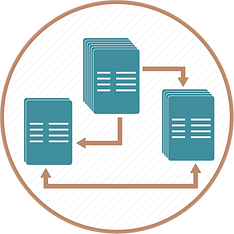


MANY TO MANY
Data Management, Program Evaluation, and Statistics
SERVICES

Database Design
Design a database that works equally well for end-users and researchers on your team. Practicality and completeness don't have to be mutually exclusive.

Data Management
Need to pull together 10 datasets from multiple different sources? No problem. Rearranging and merging data so it can be better understood is my bread and butter.

Reporting & Statistics
Find out the what you're doing that is most effective and what can go. Data reporting can guide your internal program development as well as publish on your work!

CEO
Melissa Bond, Ph.D.
I have a Ph.D. in Clinical Psychology, which gave me the first-hand experience of providing services for underserved populations within universities and community mental health agencies. Throughout my training, I developed a passion for the messy data that comes from these kinds of programs. It is my belief that the service providers and researchers within a program can mutually benefit from one another and the right database and resulting reports is helpful for all groups involved!
To learn more about my past work, both clinical and research, check out my CV!
Outside of this work, I also enjoy: photography, graphic design, cooking and baking, and spending time with my husband and dog.

ABOUT MtM
The term "many-to-many" is often used when referring to relational databases. Databases can be related through "one-to-one", "one-to-many", or "many-to-many" relationships. "Many-to-many" relationships come up all the time, but also create a more complex data structure which is harder to understand and parse. A common example of "many-to-many" relationships is that of clients and service provides. A single client within an integrated system may see multiple different service providers (e.g. therapist, case manager, medical doctor) but each of those service providers also have a caseload with multiple clients! If we have a dataset of clients and another of service providers, we would say that these datasets have a "many-to-many" relationship.
Real-life data of clients receiving services is complicated, messy, and often related in many layered ways. I specialize in setting up the optimal database structure for this kind of data, managing complex and interrelated datasets, and helping others to better understand their data, either for program evaluation, grant reports, or publication. I can help you build a new project from the ground up, or jump in at a midpoint and help you continue to improve on the work. Since I have a background in psychology and theoretical knowledge, I can also help you to integrate your findings into the theory your data is examining.

Frequent Collaborators
Robert Wickham, Ph.D.
Dr. Wickham is a professor at Northern Arizona University and is a data extraordinaire! He received his Ph.D. in Social Psychology, with a minor in Quantitative Methods, from the University of Houston in 2012. His research focuses on the development and application of new methodological approaches in psychological research and applied program evaluation research in the area of homelessness intervention.
We collaborate often on data projects and bring similar, but complementary skills. I am able to think about the data from the perspective of a service provider, but whenever I need extra assistance with advanced statistics, he is my go-to person!
